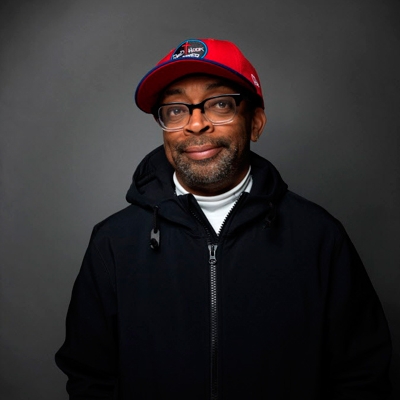Filmed entirely on one block in Brooklyn’s Bed-Stuy neighborhood Spike Lee’s “Do the Right Thing” examines the race relations between the Italian American and African American communities that reside there. Set on the hottest day of the year, these tensions eventually erupt into a violent race riot that leaves the block covered in broken glass and charred pizza boxes.
In 1989, people feared the film would start riots. This was a bigoted response. The film is written in tears, not blood. This year is the film’s 30th anniversary.
On Tuesday, Professor Spike Lee gave a talk about the film at NYU’s Skirball Center for the Performing Arts in conversation with Professor Sheril Antonio from the department of Art and Public Policy. He came on stage in a purple NYU beanie, hoodie, and beige Air Jordan 4.
When asked about his major film influences, Lee answered “Motherf-cking ‘Birth of a Nation,’” D.W. Griffith’s 1915 film which glorified the Ku Klux Klan and led to the organization’s rebirth. For Lee, the film’s hatred serves as an artistic counterpoint for his own work.
“The Birth of a Nation” is part of the epic genre, like other films Lee named as influences, such as David Lean’s “Lawrence of Arabia” and “Doctor Zhivago.” These works tell stories with a large, sweeping scope, often accompanied by orchestral music. Although shot only on one block, Lee’s “Do the Right Thing” finds vastness in its moral scope.
The movie is also notable for its score, written by Lee’s father, Bill Lee. Again drawing from the epic genre, sidewalk strolls are accompanied by a full orchestra, making these mundane moments feel timeless. The film is as relevant today as it was then. Besides this, the film centers around one song: “Fight the Power” by Public Enemy.
Spike Lee explained that he worked with Chuck D to craft the song, which was written after the film finished production. Radio Raheem’s (Bill Nunn) boombox, whose blasting of “Fight the Power” drives the film’s plot, was silent during filming. “Don’t be naive,” Lee joked, “We add all those songs in post.”
Lee spent much of his talk explaining his writing process. He believes in lightning-fast turnover and a strong work ethic. Lee graduated NYU’s graduate film program in 1982, and by 1989 was filming his third movie. He wrote “Do the Right Thing” in just 15 days during March of 1988. Still, Lee scoffs at the marathon claims of other writers: “People say you have to write 12 hours a day […] Those guys aren’t writing 12 hours. They check their phones.”
Cellphones were a big point of contention for Lee. He said, “If you don’t turn your phone off to write ‘you’re not serious. Focus on the task at hand.’ Almost immediately someone’s phone rang in the theater’s first row. Lee jumped up and said, “You’re lucky we’re not on set – when my cameras are rolling and there’s a phone alarm, that’s 100 bucks.’
Lee outlined his routine when writing “Do the Right Thing”: He would wake up at 7:30 a.m. and go down to the bodega. There, he would get a coffee with milk and cream, the newspaper, and an everything bagel with cream cheese. Back upstairs, he would sip and read the sports section, and then he would throw the paper away. Lee said, “Everything that’s going to happen in the world, it’s going to happen in sports first.” After this, Lee would write for three to four hours.
Lee shared a final anecdote about “Do the Right Thing.” Near the end of the movie, a wall at the pizzeria covered in pictures of Italian American celebrities burns down – a triumphant moment for the African American rioters who feel that a wall of celebrities in Bed-Stuy should feature African American celebrities. In real life, Italian people were not pleased.
For his 1991 film “Jungle Fever,” Lee wanted to use a Frank Sinatra song. Sinatra was still angry — he had been in one of the pictures. To appease him, Lee wrote Sinatra a letter promising that no Italian American likenesses would be harmed in the making of his film.
Lee got the rights to the song.
He says, “Listen, DeNiro and Pacino were on that wall, too. They never gave me any trouble!”
Email Charles Smith at [email protected].























































































































































